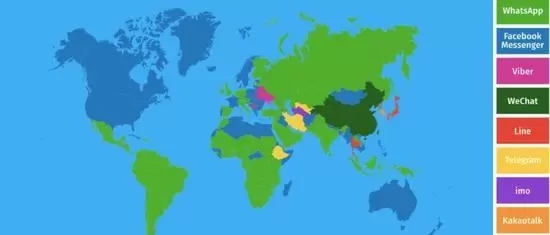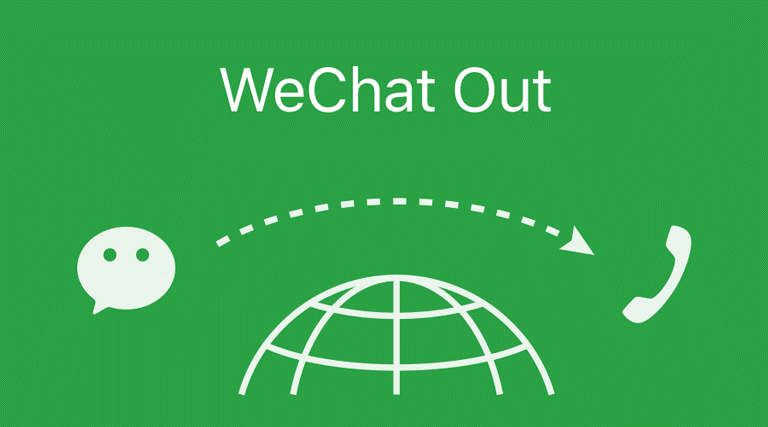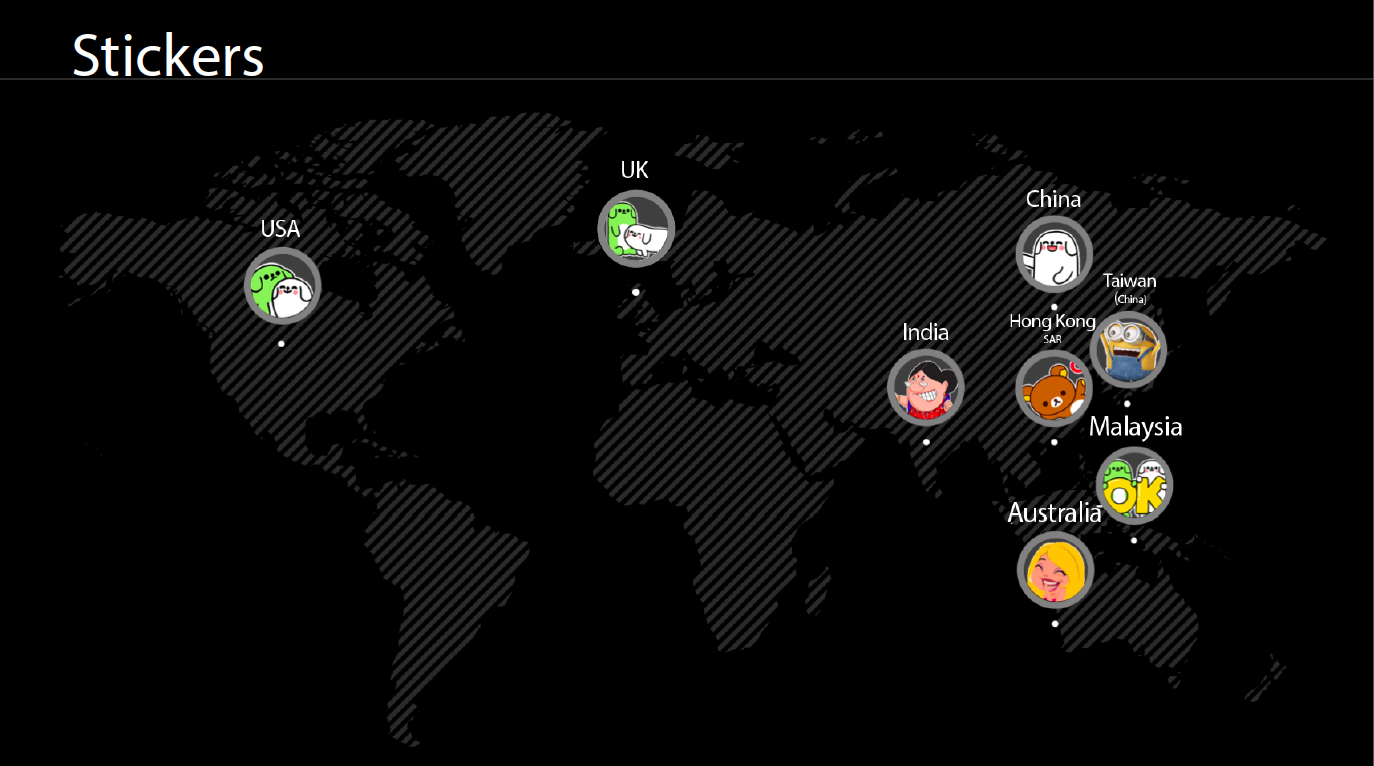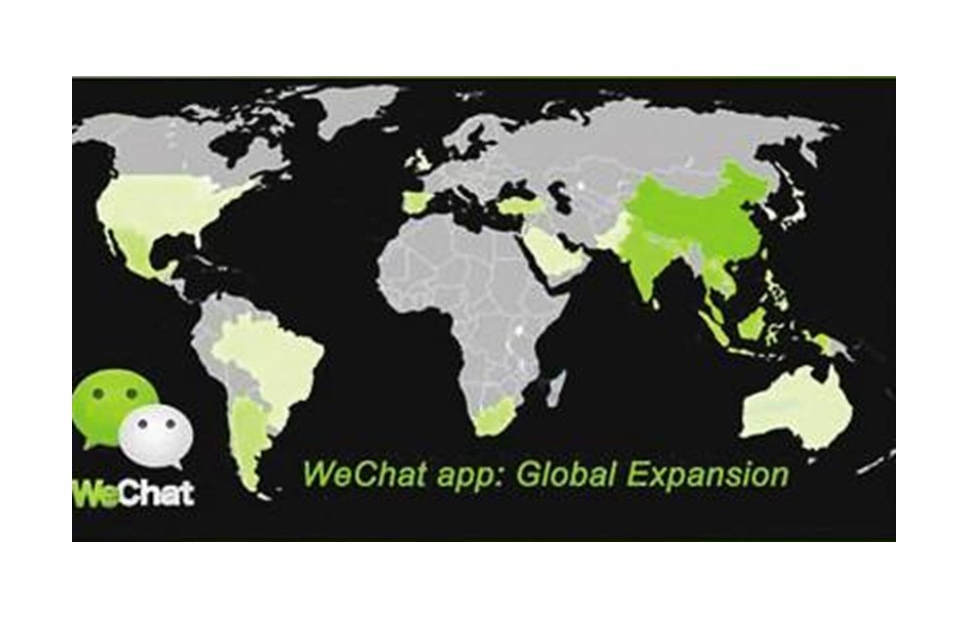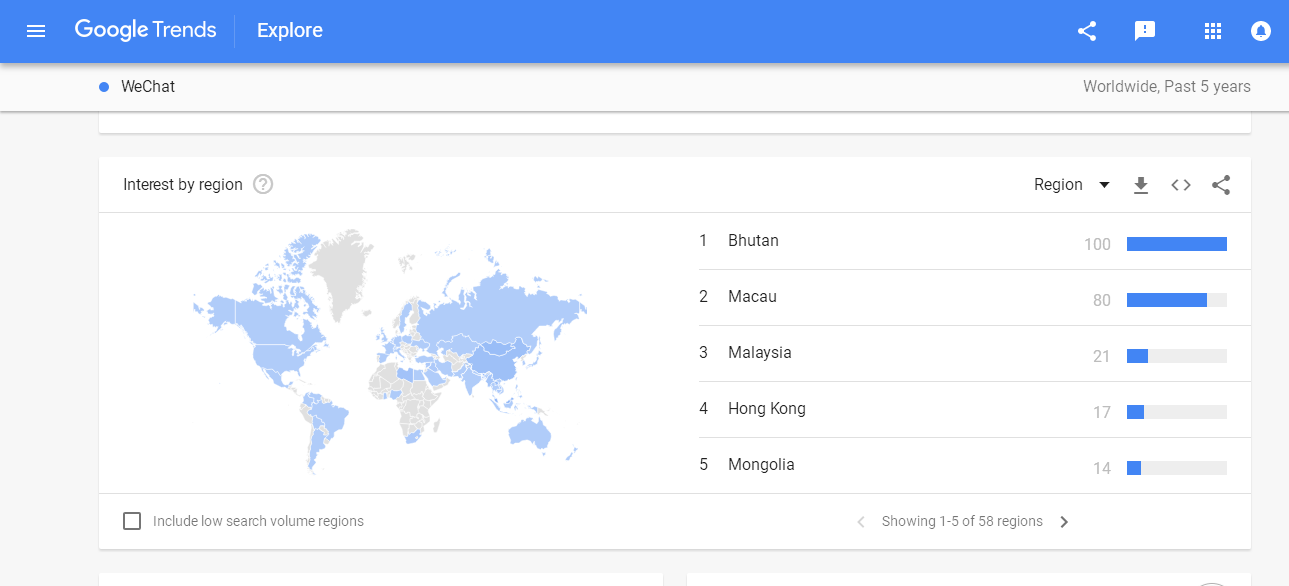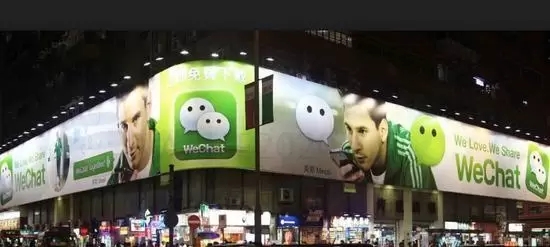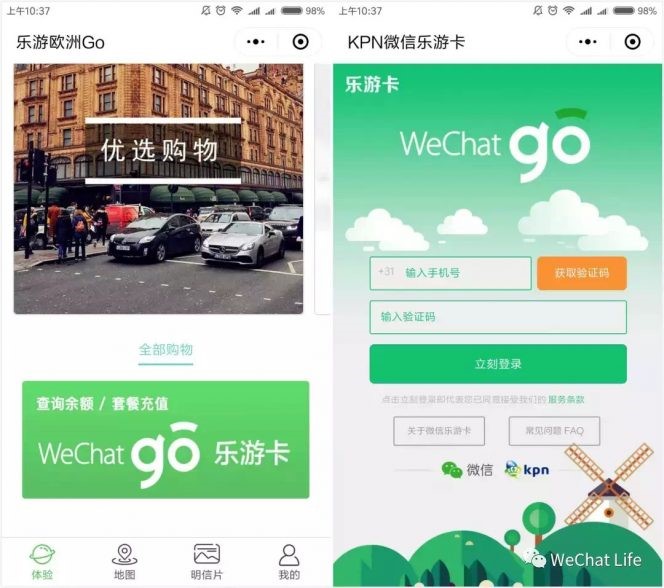
WeChat - A super app from China
What is WeChat? And why do people call it a super app? This article introduces this all-in-one Chinese app and its unique features from the perspective of globalization, cultural flows and scapes.
WeChat, globalization and the network society
"A new economy emerged in the last quarter of the twentieth century on a worldwide scale. I call it informational, global, and networked to identify its fundamental distinctive features and to emphasize their intertwining "( Castells, 1996).
Under the influence of globalization and the fast development of technology, especially in terms of the communication revolution, social media came into existence and prevailed in the digital era.
Social media like Facebook, Instagram, Twitter and WhatsApp are becoming a major trend and inevitable part of everyday life in most of the world. The emergence of WeChat came along with global flows of knowledge, technology and culture. WeChat not only connects users in China, but people all over the world.
WeChat's super app can be analysized with Appadurai's (1990) terms: ethnoscape, mediascape,technoscape and finanscape. Ethnoscape refers to mobility of people who constitute the distribution of WeChat users worldwide. Tourism, labor migration, and expatriates all lead to the global mobility of WeChat and bring more global users.
Mediascape means the capability to produce and disseminate information and provide large complex repertoires of images, narratives and ' ethnoscapes' to viewers throughout the world, in which the world of commodity, the world of news and the world of politics are profoundly mixed.
WeChat as a messaging app facilitates the exchange and flow of news and information, however, it's also a commercial app which creates a lifestyle of commodification and convenience through combing multiple functions.
In terms of technoscape, WeChat has solid technical support for its accessibility worldwide and in different devices and platforms. Finanscape indexes that global capitalism and international trade made WeChat Pay an advantageous way to influence users' consumer behaviors. In the end, the relationships between ethnoscapes, mediascapes, technoscapes, and finanscapes are deeply connected and unpredictable.
Why is WeChat called a super app?
WeChat, Weixin in Chinese, is a free chat app for mobile devices that offers free video and voice calls, videos, images, games, stickers and text messages to help you stay connected with people who matter most. WeChat was launched in 2011 by Tencent, a leading internet service provider in China. WeChat has developed into an all-in-one app that people in China can use to call a taxi, order train and flight tickets, order takeout meals, do online shopping, purchase cinema tickets, book a hotel, rent public bicycles, pay household bills, and even trade second-hand goods.
People in China can use WeChat to call a taxi, order train and flight tickets, order takeout meals, do online shopping, purchase cinemas tickets, book a hotel, rent public bicycles, pay household bills, and even trade second-hand goods
WeChat has created a new lifestyle that complies with modernity in a digital era and boosts online life experience of hundreds of millions users with its innovative features. The platform integrates instant messaging and social entertainment, allows users to engage in real-time communications via free text and multimedia messages, make video calls or share photos or videos on their “Moments.”
Apart from the similar free texting and calling features that WhatsApp, Facebook and other social media have, other lifestyle recreational features include “Games”, “Sticker Gallery”, “Shopping”, “Mini Program”, and convenient friend-adding services such as “Scan”, “Shake” and “People Nearby” that make WeChat unique and entertaining.
WeChat also offers companies “Official Accounts” to create original consumer experiences through its open platform and extended services. These enterprises use WeChat Pay is a feature and service which contributes greatly to cashless consumer economies in China, which is a truly mobile digital lifestyle.
What makes WeChat most intriguing is that its features and functions continuously evolve following users' needs. It has evolved into a connector and open platform across industries, connecting users with one another,smart devices and business services. A video on Youtube called “WeChat Top Feature Guide” could gives a general idea of its super power in daily life.
WeChat's technical flexibility and accessibility to various versions of systems constitute its main unique features. WeChat is accessible on mobile devices through data networks and Wi-Fi worldwide which means no matter where you are in the world, you can freely message or video call people as long as you have a mobile device with internet at hand.
For different devices and operating systems, WeChat has designed customized versions for each: WeChat Windows, WeChat Mac, WeChat Web, WeChat for Android and iOS, Blackberry and Nokia phones. Over 100 countries’ users can register WeChat accounts with their phone numbers WeChat also supports 21 different interface languages.
Over 100 countries’ users can register WeChat accounts with their phone numbers. WeChat also supports 21 different interface languages
English being an international language, the recent feature of 'scan to translate' between English and Chinese is making daily communication much easier for both foreigners in China and Chinese traveling abroad. When struggling with an English or Chinese menu or a text on a shop window, you can use the "Translate" function in the "Scan", you can find it by clicking "Discover" tab.
In December 2015, WeChat officially launched its VOIP (Voice over Internet Protocol) business service: WeChat Out. WeChat Out provides good call quality to mobiles and landlines and also offers low calling rates.
However, WeChat Out is only available for users outside mainland China. It is suspected that this is simply an act to enhance part of WeChat's functions to confront international competitions, as Line and Skype also have released similar services in the same year. As for domestic users, most of them don't have the habit to use VOIP services while the western world has already started using Skype. The dominance and restrictions from domestic telecom operators is also a major cause.
As an integrated feature and convenient service, WeChat pay enables users to conduct quick transactions on their phones through attached bank accounts. WeChat pay supports direct transactions between CNY and ten other different foreign currencies. It is a rather safe and efficient payment service. With more and more Chinese people travelling to other countries, especially in Southeast Asian countries, WeChat Pay has become one of the most popular ways for payment during travel in countries such as Malaysia, Thailand and Indonesia.
WeChat Wallet, a digital wallet embedded in WeChat Pay that allows users to attach bank cards and make instant payments and transfers, was launched in South Africa in 2015. China CITIC Bank was the first bank institution to embrace e-payment solutions in Hong Kong, and launched its instant bank payment service to WeChat Pay.
WeChat's official accounts & Mini Program
We live in a network society: information and knowledge have always been critical components of economic growth, and the evolution of technology has indeed largely determined the productive capacity of society and standards of living, as well as social forms of economic organization" (Castells, 2010). Besides its main function of messaging, WeChat also provides resourceful information and news on its platform.
An enormous user base, efficient payment service, and innovative business model in Mini Programs create great advantages for WeChat to monetize through brand advertising, membership management, and other entertainment and commercial services such as mobile gaming and online shopping.
WeChat has definitely boosted the prosperity of e-commerce globally
WeChat as an integrated ecosystem combined multiple business models and functions. More and more international brands have WeChat official accounts, which is an efficient channel to promote and market their products and services but also to boost customer loyalty and service.
WeChat has definitely boosted the prosperity of e-commerce globally. Mini Programs can be seen as light apps within WeChat, with no need to download anything. They allow merchants to reach an enormous population of potential customers for online marketing and purchasing. Mini Programs are used in five sectors: Retail (Walmart, Family Mart), E-commerce (JD), Lifestyle (resturants, bike rent, buying movie tickets), Mini Games and Goverment Service( pay fines, upload court trails).
To give a simple example: if people want to order a burger from McDonalds, they don’t need a McDonalds app on their phone. All they need to do is search for the McDonalds Mini Program within WeChat. They order the food and pay both through WeChat and go back to whatever they were doing. China is the world's largest market for luxury products, and WeChat-based marketing is a necessary strategy for brands to localize and tap into the market. With one million Mini Programs and 600 million monthly active users, Mini Programs have no doubtgranted brands a more robust channel to access consumers.
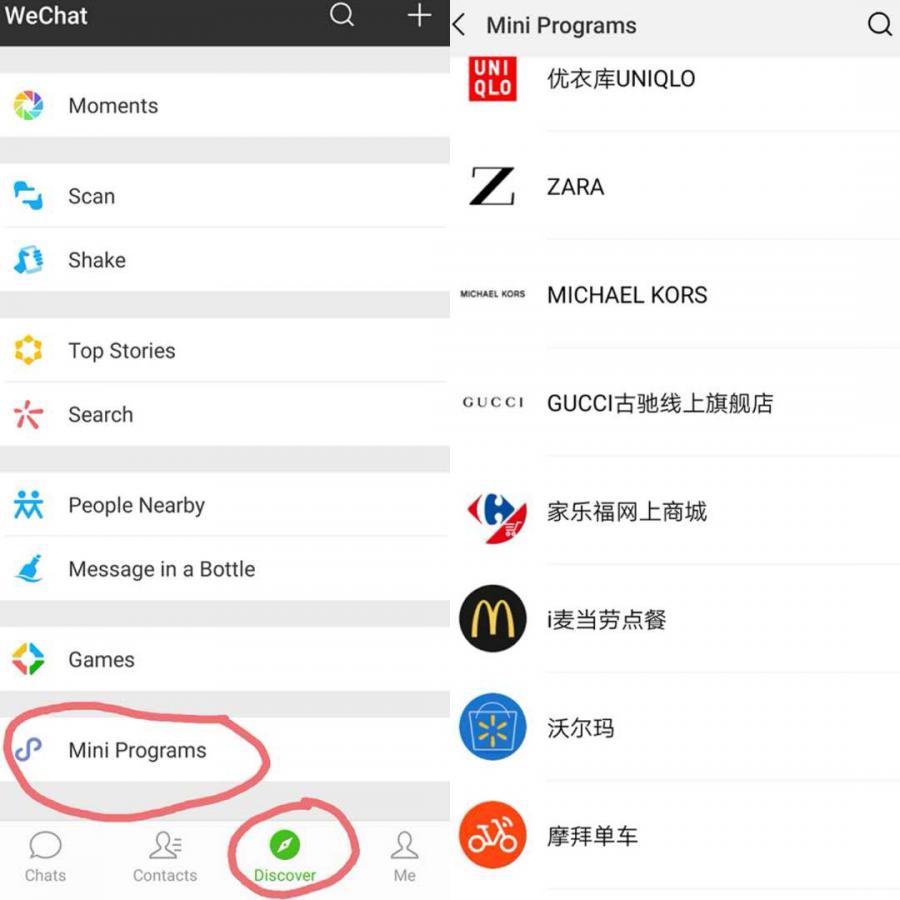
Multinational stickers/emojis in WeChat
Stickers/Emojis have different indexicalities as one of the top popular features in WeChat. First,surface semiotic content reveals the cultural diversity involved. Second, semiotics express various layers of meaning in different contexts and also reflect how diversified the WeChat users are in terms of nationality, culture and ethnicity. Stickers create meaning and bonds or connections in online communication. As Blommaert and Varis (2012) state:
"Although the demands of recognizability and the identity templates of consumer culture keep our accents in check, in a superdiverse world of global flows, articulations and identities become less and less predictable. The super semiotic of the internet provide for the easy creation and fast publication of potentially infinite creation of accents- and infinitely fractured range and scope of 'how to'."
Below are some examples of the diversity of semiotics.
To celebrate Singapore’s 50th birthday on August 9, 2015, an Ang Ku Kueh girl sticker set was introduced. Itwas inspired by the traditional Singaporean snack Ang Ku Kueh, a red tortoise cake which is made of soft sticky glutinous rice pastry wrapped around a sweet center. The stickers intended to deliver universal values such as love, kindness and tenacity, and spread the beautiful image of Singapore’s local culture and heritage.
Indian winner’s creation at WeChat World Sticker Challenge
Different regions in the world have different taste for favorite sticker sets.
Distributions of WeChat users: Chinese and Non-Chinese
In the third quarter of 2018, WeChat monthly active user accounts reached more than 1.825 billion. The majority of WeChat users are native Chinese. Ethnic Chinese overseas use WeChat to communicate with their family in China, and foreigners living in China socialize through WeChat. WeChat has also become the dominant messaging and video app in the country of Bhutan. As the Internet is widely available in Bhutan, almost one-third of adults use WeChat in their mobile devices. In Macau, Hong Kong, Singapore, WeChat has also gained a lot of popularity among social media apps.
Global distribution of WeChat users in January 2013
As the above map shows, apart from China, WeChat is also popular in Southeast Asia , compared with Europe, North and South America and South Africa, who have fewer WeChat users.
WeChat on its way to the world
Due to national boundaries and different government policies, foreign apps find it difficult accessing the Chinese market; the same applies to Chinese local apps trying to go abroad. In order to expand WeChat's popularity in global markets, Tencent offers a budget of 2 billion RMB for international development of WeChat even though WeChat has been facing great competition from other social media apps.
Multifunctional WeChat may encounter some difficulties and discrepancies in its expansion in other countries. Poor localization could be the main reason for WeChat's restricted development overseas. WeChat hasn’t shown the same level of adaptation for international markets.
For example, WeChat cannot offer food deliveries or movie ticket services in the US like they do in China. In the case of stickers, in different countries there should be different themes, such as Carnival themed stickers for Brazil and American football stickers for the US. Even though WeChat has faced great challenges from Alipay in payment services, its goal is to create a seamless experience at home and abroad by integrating its payment service with Chinese consumers’ daily lives.
Tencent built up its first overseas WeChat team in America in 2012. The WeChat Mini Program’s innovative business model has been selected into one of the top 15 world leading internet scientific and technological achievements in 2018 at the 5th World Internet Conference.

World-famous football celebrities advertizing WeChat
As Van Dijck (2013) states:
"Connectivity derives from a continuous pressure — both from peers and from technologies — to expand through competition and gain power through strategic alliances. Platform tactics such as the popularity principle and ranking mechanisms hardly involve contingent technological structures; instead, they are firmly rooted in an ideology that values hierarchy, competition, and a winner-takes-all mind-set."
As the poster above shows, the famous Argentina football star Lionel Messi is advertising for WeChat to the world. Even though the effect of advertising is uncertain, at least, WeChat is making its efforts to gradually walk onto the main stage of the world.
Nowadays WeChat is getting more and more attention through the internet. Recently, an American TV series called “Startup” accidently advertised for WeChat in Hong Kong. In the episode, a taxi driver is driving crazily in a crowded Hongkong night market because he is so busy with his phone. Then the passenger gets angry and finds out the driver is obsessed with his WeChat, “the only app in his phone and it’s all-in-one,” according to his words.
In other parts of the world, WeChat has built business with different enterprises. For example, in the US, WeChat partnered with LinkedIn to promote its popularity in the American market, and, what’s more, the global payment service provider Western Union offers WeChat users in America its global money transfer service. In South Africa, WeChat cooperated with the Standard Chartered Bank to provide payment service to retailers. In Malaysia, WeChat has a localized digital wallet. Malaysia is the first country after China and Hong Kong where WeChat has rolled out a local version. As a payment method, WeChat Pay is accepted in over 40 countries and regions where it serves Chinese tourists, according to the company.
In Europe, WeChat Go is a travel tool to serve 120 million Chinese travelers abroad each year. In Europe, to boost the travel experience, WeChat cooperated with Netherlands Royal Communications Group (KPN) to launch the WeChat Go “Europe Experience” in the platform of a Mini program in March 2018.
In South Korea, Japan, and other countries, many stores support WeChat Pay to boost their sales and customer loyalties. The most important factor for WeChat’s development in the international market is to customize its strategy and features to each local market and convince a number of international and local brands to join its platform.
Will WeChat conquer the world?
The term globalization is most commonly used as shorthand for the intensified flows of capital, goods, people, images and discourses around the globe, driven by technological innovations mainly in the field of media and information and communication technology, and resulting in new patterns of global activity, community organisation and culture (Castells 1996; Appadurai 1996).
Mobility of people, goods, culture, technology and capital, along with internet and mobile phones as infrastructure have contributed to the global expansion of WeChat and its super power.
WeChat Pay, WeChat Out, WeChat Go, Official Account, Mini Program and Stickers are all integrated into WeChat ecosystem. Its all-in-one multifunctionality and accessbility make WeChat a leading lifestyle and a competent international social media app.
However, its influences in Europe, America and some other part of world is still lacking. The majority of users are still the Chinese population. It's still a long way to go for WeChat to perfect its localization in international markets and to exhibit its salience in the globalized and superdiverse world.
References
Appadurai, A. (1990). Disjuncture and difference in the global cultural economy. Theory, Culture & Society, 7(2-3), 295-310. doi:10.1177/026327690007002017
Appadurai, A. (1996). Modernity at Large. Minneapolis: University of Minnesota Press.
Blommaert, J. (2010). The Sociolinguistics of Globalization. Cambridge, UK: Cambridge University Press.
Castells, M. (1996). The Rise of the Network Society. London: Blackwell.
Van Dijck, J. (2013). The culture of connectivity : A critical history of social media. Oxford: Oxford University Press.
Varis, P., & Blommaert, J. (2012). How to ‘how to’? The prescriptive micropolitics of Hijabista. Tilburg Papers in Culture StudiesUniversity. Paper 30 (2012).
https://help.wechat.com/cgi-bin/micromsg-bin/oshelpcenter?opcode=2&lang=...
https://www.tencent.com/en-us/system.html
https://www.youtube.com/watch?v=c_EMxBmQbVU
https://blog.wechat.com/2015/12/31/new-year-new-feature-wechat-out/
https://technode.com/2018/01/18/wechat-mini-programs-2017/
https://technode.com/2018/08/15/wechat-mini-program-valentines-day/
https://technode.com/2018/08/22/wechat-wallet-malaysia/
https://technode.com/2018/03/12/wechat-nonstop-features/
https://blog.wechat.com/2018/04/03/wechat-go-the-one-travel-tool-to-rule...
https://www.researchgate.net/Global-distribution-of-WeChat-users-in-Janu...
https://blog.wechat.com/2015/10/25/celebrating-wechat-india-world-sticke...
https://blog.wechat.com/2015/11/03/new-data-revealed-what-is-the-wechat-...
https://www.techinasia.com/3-reasons-wechat-failed-internationally-chine...
